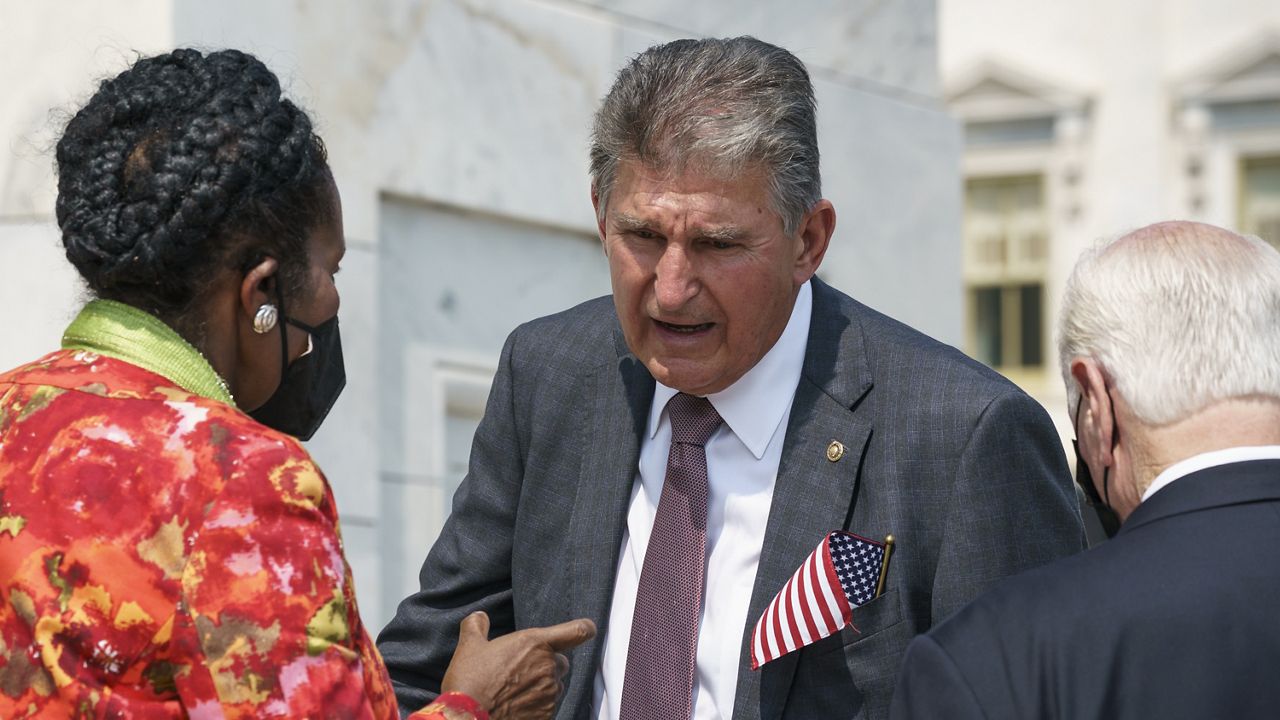President Joe Biden was set to meet Wednesday with a pair of moderate Democratic senators – Sen. Kyrsten Sinema, D-Ariz., and later with Sen. Joe Manchin, D-W.Va. – whose objections to the size of a proposed $3.5 trillion package of social and environmental initiatives have thrown serious obstacles in its path.
The legislation, now known as the Build Back Better Act, represents the heart of the president’s domestic agenda, and the stakes are high for Biden and his party for finding a pathway to push the measure through the closely divided Congress.
Sinema and Manchin have said the $3.5 trillion, 10-year plan — a size backed by Biden and Democratic congressional leaders — is too large. Democrats will need every one of their votes in the 50-50 Senate to move a final package through that chamber, along with Vice President Kamala Harris’ tie-breaking vote, and can lose no more than three Democrats in the House.
A spokesperson for Sinema called the meeting "productive" and said that the Arizona lawmaker "is continuing to work in good faith with her colleagues and President Biden as this legislation develops."
Manchin has been especially outspoken, writing an op-ed in the Wall Street Journal earlier this month calling for Congress to take a “strategic pause” on the legislation. He said on last Sunday’s television news shows that he could not support $3.5 trillion, and instead suggested a topline figure in the $1 trillion to $1.5 trillion range.
“I cannot support $3.5 trillion,” Manchin said, citing in particular his opposition to a proposed increase in the corporate tax rate from 21% to 28% and vast new social spending.
“We should be looking at everything, and we’re not. We don’t have the need to rush into this and get it done within one week because there’s some deadline we’re meeting, or someone’s going to fall through the cracks,” he said.
Pressed repeatedly about a total he could support, Manchin said, “It’s going to be $1, $1.5 (trillion).” He later suggested the range was based on a modest rise in the corporate tax rate to 25%, a figure he believes will keep the U.S. globally competitive.
“The numbers that they’re wanting to pay for and the tax changes they want to make, is that competitive?” Manchin asked. “I believe there’s some changes made that does not keep us competitive.”
Progressives have said cutting the package to that range would be unacceptable. Many of them initially demanded a $6 trillion plan.
Manchin told senators at a closed-door lunch Tuesday that he saw nothing “urgent” in the emerging package, according to two Democrats familiar with the private meeting.
The senator reiterated his position that the only urgent spending was in the $1 trillion public works package that the Senate approved last month and is awaiting House passage.
The White House meetings come as the last of 13 House committees were pushing toward completing their work Wednesday on their individual sections of the overall bill.
Among those meeting was the Ways and Means Committee. Chairman Richard Neal, D-Mass., has proposed a revenue package that includes $2.1 trillion in higher taxes, mostly on the rich and corporations.
It also claims other savings from stronger IRS tax enforcement and lowering prices Medicare pays for pharmaceuticals; it also asserts that the legislation itself would spark economic growth.
The Democrats are proposing that the top tax rate rise back to 39.6% on individuals earning more than $400,000 — or $450,000 for couples — in addition to a 3% surtax on wealthier Americans with adjusted gross income beyond $5 million a year. For big business, the proposal would lift the corporate tax rate from 21% to 26.5% on companies’ annual income over $5 million.
In the Ways and Means panel’s session, Republicans pushed to keep the corporate tax rate at 21%, where it was set by former President Donald Trump’s 2017 tax law. That effort, facing failure in the Democratic majority committee, sparked heated partisan debate over the role of business in the economy and the use of tax loopholes by big corporations to avoid liability.
Republican lawmakers accused the Democrats of falsely portraying themselves as defenders of middle-income and working Americans. “We’re going to be destroying jobs in America,” said Rep. Drew Ferguson, R-Ga.



